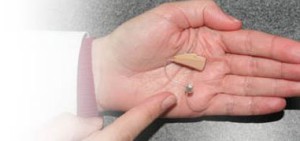Beth P. Mann, MS, CCC-A (Head of Audiology)
Laura A. Braswell, AuD, CCC-A
How do I determine if I am a candidate for a hearing aid?
Indicators that you may be a candidate for a hearing aid include:
-
You frequently complain that people mumble, speech is not clear, or you hear only parts of conversations when people are talking
-
You often ask people to repeat what they said
-
Your friends or relatives tell you that you do not seem to hear very well
-
You do not laugh at jokes because you miss too much of the story
-
You need to ask others about the details of a meeting that you just attended
-
Others say that you play the TV or radio too loudly
-
You have trouble hearing women and children
-
You find that looking at people when they talk to you makes it easier to understand
-
You find it difficult to understand conversation when you’re in a noisy place

How Hearing Loss Impacts Your Family
Hearing loss not only alters an individual’s lifestyle but also affects relationships with family members. Hearing loss is often first noticed when high pitched sounds such as birds singing or leaves rustling are difficult to hear. Many sounds that give speech clarity also fall into this high pitched range. Therefore, understanding speech, especially similar-sounding words, may be difficult when hearing loss occurs.
Communication breaks down as conversations are misinterpreted. Many people complain that their grandchildren are “mumbling,” not realizing that their high-pitched voices are difficult to hear. One should realize that the whole family is under stress from constantly having to raise their voices or being asked to repeat during conversation. Constant misunderstanding of what is being said may cause ill-will and reluctance by family members to initiate conversation. This reluctance may result in the individual with a hearing loss withdrawing from daily life and becoming isolated.
The longer hearing loss is neglected, the more difficult it is to cope with the psychological impact. Those with hearing loss are separated from the world of sound. If you can re-establish contact with a world that is still very much alive, you can remain a part of it. Consider the alternative, there is no time to lose!
How Do I Get a Hearing Aid from Mann Ear, Nose & Throat?
If you think you may be a candidate for hearing aids and you are interested in which hearing aids are most appropriate for you, make an appointment online or call our office at 919-859-4744 to schedule a hearing test and a hearing aid evaluation. At this appointment, a hearing evaluation will be performed, and medical clearance for hearing aids by our physicians will be obtained. The most appropriate hearing aids for you will be discussed. Once you have decided which hearing aids you would like to purchase, impressions of your ears will be made and the hearing aids will be ordered.
With the purchase of hearing aids from Mann ENT, you will receive a 3 year warranty. This warranty will cover any repairs, loss and damage coverage, and all programming adjustments during the 3 year warranty period.
When the hearing aids arrive, an appointment will be made for your fitting. During this visit, we will program the hearing aids and explain their basic use, maintenance and care. After deciding that you would like to begin a monitored 30 day adjustment period, half of the total price of the hearing aids will be requested.
During your trial period, we will see you for follow up appointments at your request to make further programming adjustments and make sure that you find them useful. At the end of this 30 day adjustment period, the remaining balance will be requested for full purchase. If you choose to return the hearing aids, you will receive a refund of the full amount you paid, less a fitting fee and earmold material costs.




Myths About Hearing Loss and Hearing Aids
Myth #1: Only people with serious hearing loss need hearing aids.
The need for hearing aids is dependent on your lifestyle, your need for refined hearing, and the degree of your hearing loss. If you are in situation where conversation is important, then even a mild hearing loss can be intolerable and frustrating.
Myth #2: Hearing loss affects only “old people” and is a sign of aging.
Only 35% of people with hearing loss are older than age 64. There are close to six million people in the U.S.between the ages of 18 and 44 with hearing loss, and more than one million are school age. Hearing loss affects all age groups.
Myth #3: Hearing loss is normal for my age
Isn’t this a strange way to look at things? It happens to be “normal” for overweight people to have high blood pressure. That doesn’t mean they should not receive treatment for the problem. Hearing loss can be considered the same way.
Myth #4: Your hearing loss cannot be helped.
In the past, people with hearing loss in one ear, with a high frequency hearing loss, or with nerve damage have been told they cannot be helped. This might have been true many years ago, but with modern advances in technology, nearly 95% of people with sensorineural hearing loss can be helped with hearing aids.
Myth #5: The consequence of hiding hearing loss is not as bad as wearing hearing aids
Untreated hearing loss is far more noticeable than hearing aids. If you miss a punch line to a joke, or respond inappropriately in conversation, people may have concerns about your attention span or your ability to communicate effectively. At a simplistic level, untreated hearing loss means giving up some of the pleasant sounds you used to enjoy. At a deeper level, vanity could severely reduce the quality of your life.
Myth #6: Hearing aids will make me look “old.”
If hearing aids help you function in conversation like a normal hearing person, for all intents and purposes, the stigma of “elderly” is removed. An untreated hearing loss is more obvious than a hearing aid. Smiling and nodding your head when you don’t understand what’s being said, makes your condition more apparent than the largest hearing aid.
Myth #7: Hearing aids make everything sound too loud.
This myth may have been true for older hearing aids, however, current digital hearing aids adjust to sounds automatically. Therefore, they only provide the amount of amplification needed so that sounds are at normal loudness levels and comfortable to the listener.

Why Do I Need Two Hearing Aids?
If you have a hearing loss in both ears, you will likely need two hearing aids. When hearing loss affects both ears, and only one hearing aid is used, the brain only receives half of the information. The benefits of wearing two hearing aids include:
-
Better understanding of speech:Two hearing aids deliver more of the sounds you need so your brain can process the sounds correctly. Wearing two hearing aids allows for the smoothest, sharpest, most natural sound quality. Additionally, two hearing aids require less volume resulting in less distortion.
-
Better understanding in noise: Hearing with both ears makes it easier to understand speech in difficult listening situations.
-
Better ability to localize sounds: With two hearing aids, you can more easily locate the direction of sounds (conversations, traffic, etc)
-
Wider hearing range: When hearing with two ears you can hear sounds from a further distance
-
Possible deterioration of the unaided ear: Research now suggests that there can be changes in the way your brain processes sound when it is “starved.” Thus, providing stimulation to both ears may be important in preserving your auditory system




